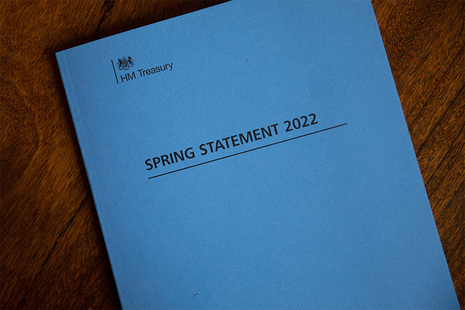The 23rd March 2022 was a day that had all business owners on tenterhooks, as Chancellor Rishi Sunak delivered his much-anticipated Spring Statement.
Back in 2021, Sunak outlined his autumn spending plan with the aim of ushering in a post-COVID era. Five months on, and businesses are continuing to adjust to a post-pandemic market, and the Chancellor is tasked with mapping the nation’s road to recovery. While the UK economy grew by 7.5% in 2021, and is predicted to grow by 3.8% this year too, fast-rising inflation and other pressures are putting the squeeze on businesses and individuals alike.
Here, we’ve broken down everything you need to know about the latest announcements – and how the new changes will affect your business.
National Insurance threshold increase
Earlier this month, Make UK found that 60% of companies believed the planned increase in National Insurance payments would negatively impact their recruitment strategy. While Sunak didn’t scrap this as expected, he did respond by raising the National Insurance threshold by £3,000 – from £9,750 to £12,750.
The increase, which comes into effect from July 2022, marks the largest increase in a basic rate threshold the nation has ever seen, as well as the largest single personal tax cut in 10 years. But don’t let the headline fool you – the rise in National Insurance contributions is still going ahead as planned.
Income Tax reduction
Another Spring Statement headline was the plan to reduce the basic rate of Income Tax from 20p to 19p for every pound – a tax cut for workers, pensioners and savers, as Sunak put it.
Although this is a welcome reduction to tackle inflation and consequent wage growth pressures, the Chancellor was vague about when it might come into effect, promising “by the end of this Parliament” in 2024. But again, since it doesn’t come into effect for another two years, it’s fairly futile at this moment in time.
Fuel duty cut
One tax cut that is coming in immediately is fuel duty, which was reduced by 5p per litre as of 23rd March 2022 and until March 2023. This is only the second instance of a fuel duty cut in two decades – with Sunak calling it the biggest ever.
UK motoring group RAC has announced that this cut will amount to a £3.30 saving when filling up a standard 55-litre family vehicle. This is sure to come as a relief for business owners whose operations rely heavily on transport or deliveries.
Other announcements
As far as wider support for businesses goes, most were left disappointed by the statement.The Chancellor reiterated some of the points from his 2021 Autumn Budget – namely the Help to Grow: Management and Digital initiatives, as well as the business rate cuts and investment allowance increases that come into play in April.
There was no mention of a freeze on VAT for hospitality, which the sector has been asking for consistently. What’s more, the £1,000 increase in the Employment Allowance is a small pittance in the context of rising levels of inflation – with employers having to boost wages in order to match living costs.
The government promised more to come in the next Autumn Budget following consultations this summer, but as the Shadow Chancellor said, this is very much a promise of “jam tomorrow”.
Need further advice?
The Spring Statement can be especially daunting for business owners – a fact only exacerbated by the effects of COVID-19. But that’s where Nabarro Poole can help.
We’re committed to helping your business thrive – whether that’s breaking down jargon, or providing budgeting and forecasting advice. We also offer support for individuals too – businesses begin with people, after all.
Trust in our team to ensure you’re up to date with all key business issues and deadlines. Get in touch with us today.
📷 : GOV.UK

Recent Comments